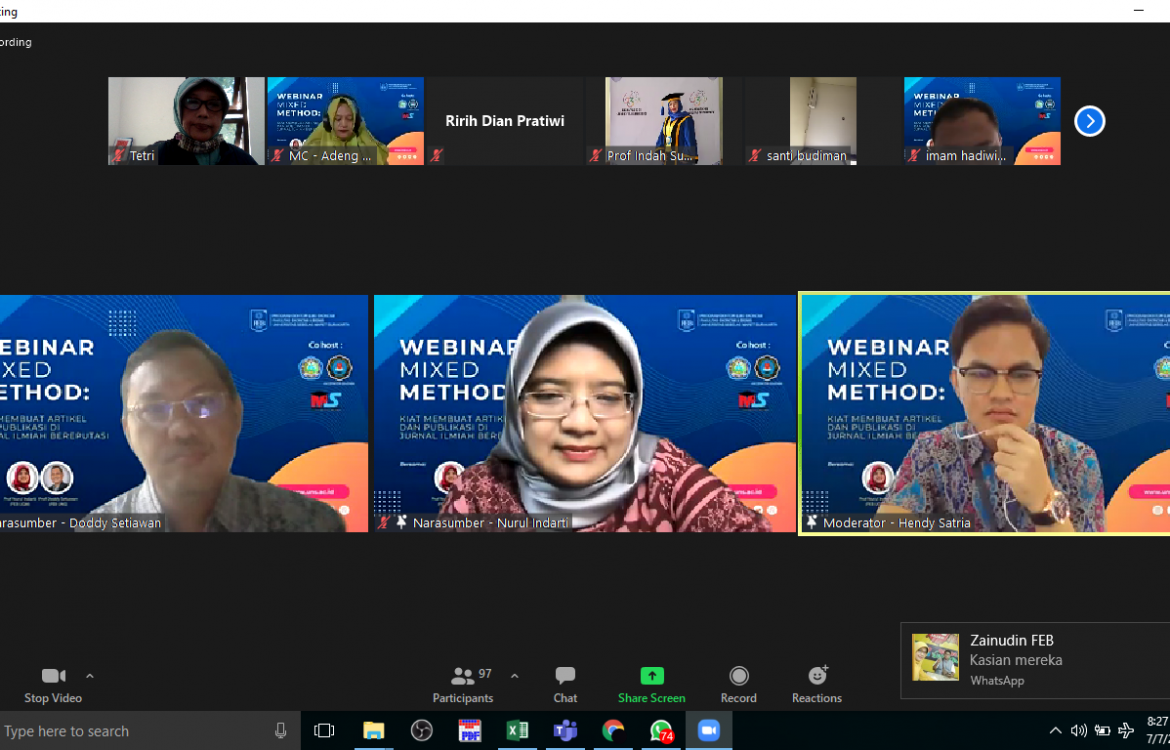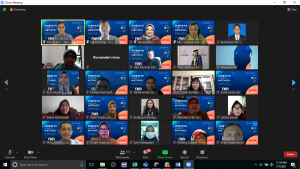
PDIE Webinar Discusses Mixed Method: Tips for Article Writing and Getting Published in Reputable Scientific Journals
The Doctoral Program in Economics (PDIE), Faculty of Economics and Business, Universitas Sebelas Maret (FEB UNS), organized a webinar titled “Mixed Method: Tips for Article Writing and Getting Published in Reputable Scientific Journals” featuring Prof. Nurul Indarti, Sivilokonom, Cand Merc., Ph.D., from Universitas Gadjah Mada, and Prof. Doddy Setiawan, S.E., M.Si., Ph.D., Ak., hosted on Wednesday, July 7, 2021.
In her opening remarks, Prof. Dr. Rahmawati, M.Si., Ak., Head of the Doctoral Program in Economics (PDIE), Faculty of Economics and Business (FEB UNS), stated that PDIE holds monthly discussions on students’ dissertations. By inviting experts, students can learn tips for writing good articles and how to get published in reputable journals, considering that publication in reputable journals is a graduation requirement for Doctoral students in FEB UNS.
“This activity is very beneficial for students, whether they are just starting, in the proposal stage, or approaching the eligibility examination. The scientific publication dynamic is rapidly evolving. During the manuscript submission, a journal might not be discontinued yet, but, right after our article gets published it could get discontinued after a few months, thus, students must be wise in selecting journals,” she concluded.
 In this webinar session, Prof. Doddy delivered material focusing on quantitative research, from finding research ideas to selecting the right journal. He emphasized that good research is completed research. The crucial thing is to have a preliminary result and a rough draft, this will enable further steps and improvements. Overthinking and hesitation can obstruct progress.
In this webinar session, Prof. Doddy delivered material focusing on quantitative research, from finding research ideas to selecting the right journal. He emphasized that good research is completed research. The crucial thing is to have a preliminary result and a rough draft, this will enable further steps and improvements. Overthinking and hesitation can obstruct progress.
He also discussed how to find research ideas. Researchers should explore fields they are interested in, such as finance, digital economics, or digital finance, as enjoying the research process is essential. “Don’t forget to conduct a thorough study on a topic. A comprehensive study will provide the foundation for creating an article that discusses the latest developments in a specific field. You can understand global research trends or examine research contexts in Indonesia,” he explained.
Finding research ideas can also involve shortcuts, such as identifying limitations or suggestions for future studies in articles published in reputable journals. For example, by collecting articles from the past two years, observing trends, and organizing them into a separate folder. Regarding crafting a good article, researchers should examine published articles from reputable journals to understand their argumentation, structure, and thought process, and then apply those insights.
Prof. Doddy also provided tips for publishing articles in reputable international journals, including avoiding journals blacklisted by the Ministry of Education and Culture, predatory journals, and hijacked journals.
The second speaker, Prof. Nurul, focused more on Mixed Method Research, where data is collected and analyzed, findings are integrated, and conclusions are drawn using both qualitative and quantitative approaches. According to Prof. Nurul, Mixed Method research can be conducted in the form of literature reviews, which involve gathering extensive literature and employing techniques such as bibliometric or statistical methods, often using software like PoP software (publish or perish software). At the beginning of its stage, a literature review may take a more quantitative form, however, in later stages literature reviews will transform into qualitative as data is collected, coded, and interpreted.
There are only two broad aspects needed in literature reviews, conceptual and technical. The conceptual tasks include selecting topics, formulating research questions, and defining keywords, while technical tasks involve searching for relevant articles, collecting, selecting, downloading, analyzing, and displaying data.
According to Prof. Nurul, literature reviews contribute significantly to scientific development and increase citation potential, considering its novelty. Literature reviews provide a comprehensive overview, highlighting the importance of research and identifying future research ideas, particularly by identifying gaps. (Humas FEB)

